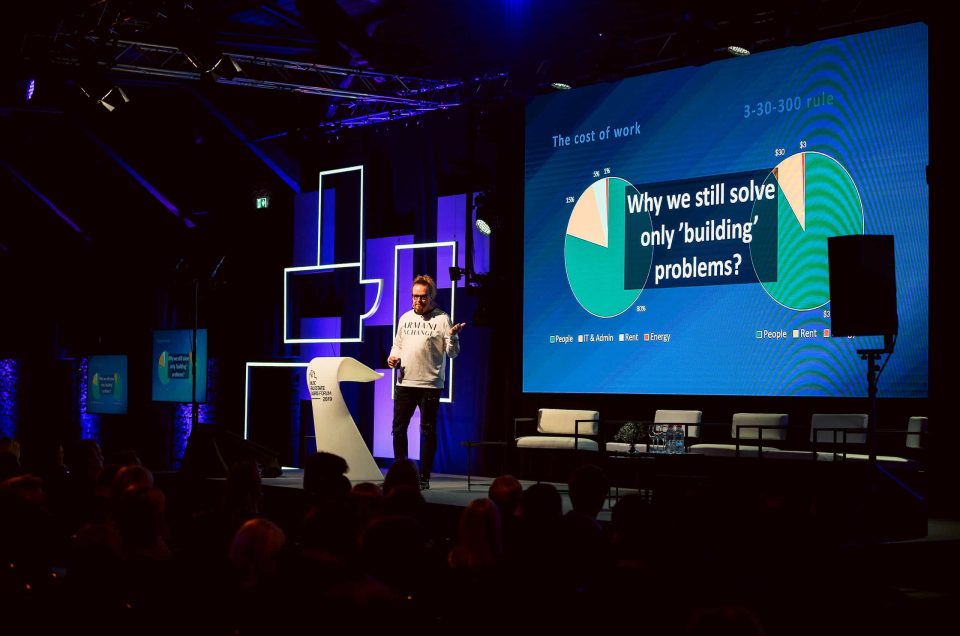The future office will be more than a workspace

The office is no longer just a space for work. It is a place of socialising and entertainment and as such, has become an important tool in employee attraction.
Developers in the Baltic States will have to take this into account if they want to continue to operate successfully in their business, an experienced representative of the industry and CEO of Eastnine, Kestutis Sasnauskas, warned at the Baltic Real Estate Leaders (BREL) Forum in Riga.
New generations of workforce and their rise to leadership positions greatly affect the commercial real estate industry. These generations have grown up with more entertainment and distractions available to them than to their parents and grandparents. As a result, they expect more from their employers, too. Millennials and Generation Z want the opportunity to work and have a good time doing it.
In order to meet these new expectations, companies will need to move their offices from city outskirts back to city centres that offer a more active social life.
Additionally, tenant satisfaction and flexibility will be key to continued ROI when it comes to leasing commercial property. As Kestutis Sasnauskas noted in his presentation, premises have become a service rather than a product; an aid rather than a permanent home.
This means shorter, easily adjustable rental agreements and more work on attracting and catering to one’s tenants with lower income in return. The time of easy profit is over.
Meanwhile, sustainability evangelist Kirsten Ritchie of Gensler emphasised the important role buildings could and should play in reducing global carbon footprint and the dangers of climate change. This will require energy-efficient, environmentally-friendly structures, deliberate planning and use of premises and a smarter choice of technology and materials.
There is a need for much more careful and sustainable planning to avoid our cities growing into huge monsters where getting to work takes several hours.
Some of the most advanced buildings in the world are currently offices of the world’s richest companies. These are environment-friendly buildings that can provide themselves with electric power and heating. Their layout, such as the placement of stairs, encourages people to move more.
In the future, more and more buildings, including residential properties, will be built this way, noted K. Ritchie.
To obtain electric power and heating, photovoltaic panels built in walls and roofs will be used increasingly, radiators will be replaced by heated floors that can heat the room more effectively, and a variety of smart technologies will ensure a minimum consumption of water and other resources.
Even now, various buildings designed by Gensler use more than 1,500 different sensors changing the temperature and brightness in the room, determining the number of people and automatically adapting the heating or air-cooling systems accordingly. Buildings with large glass windows will need to use self-tinting windows that react to the intensity of sunlight and prevent a blinding effect on office workers, whilst ensuring an optimal penetration of natural light into the room.
The environmental improvements will contribute to a more productive work. For example, studies show that natural air in the office increases work efficiency by 11% and bringing in more elements of nature in the indoor spaces increases people’s ability in creative problem solving by 50%.
Speaking about the future of the working environment, experts pointed out that it will experience fundamental changes already in the next decade.
The workplace will become diverse and multifunctional, and individual workplaces will gradually disappear. Workers will move around the room and work to solve the corresponding task in the most suitable place, using a co-working space to implementing mutual projects, in a closed booth for conference calls or intensive work, and a multi-purpose rooms for events. Specialised meeting rooms will be replaced by a more informal environment – cafes or lounges with a pleasant, relaxing atmosphere. To encourage communication, workplaces in co-working areas will no longer be separated by walls. It has been noted that operational efficiency in offices where these principles have been implemented, has increased by 2.5 times.
70% of the world’s population will live in cities and towns by the middle of this century. Hence, it is of critical importance to use all office buildings as efficiently as possible to accommodate as many people as possible. Otherwise, cities will expand rapidly, causing new logistical and environmental challenges.
There were many more valuable insights and inspirational presentations shared at the BREL Forum 2019 – on future urban values by Alexander Stahle, CEO of Spacescape, the best strategies for engaging the next generation of consumers by Ann Natunewicz, VP Retail Services at Colliers San Francisco, and the change that digitalisation brings to the real estate business as explained by Tomi Teikko, Founder of the Empathic Building.
The forum is organized by Colliers International and iDEA HOUSE events.
The forum partners are Eastnine, Origo One, developed by Linstow Center Management, Kimmel Quarter, New Hanza Capital, and Schneider Electric. Session partner – Merks.
